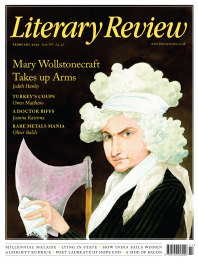Alan Judd
Some Like It Hot
The Quiet Americans: Four CIA Spies at the Dawn of the Cold War – a Tragedy in Three Acts
By Scott Anderson
Picador 562pp £20
The genesis of this book was an incident witnessed by the author in El Salvador in 1984. There was civil war between leftist rebels and the US-backed government, whose death squads murdered thousands. The government claimed ignorance of the squads, a position the United States was happy to go along with. What Scott Anderson witnessed was a young woman’s corpse being dumped from a van onto the pavement. She lay on her back in a floral-patterned red dress, bare legs extended, hands tied together on her chest. She did not lie there for long: it was a coordinated dump, and within seconds a military vehicle had pulled up and ‘recovered’ her, thus transforming her into another ‘victim’ of the rebels.
How, Anderson asked himself, had it come to this? ‘How, in the name of fighting communism … had the American government come to tacitly sanction death squads, to support governments that would so brazenly murder its own people?’ How had America, the beacon of freedom and democracy, champion of peoples oppressed by evil European colonisers, contrived ‘to snatch moral defeat from the jaws of sure victory, and be forever tarnished’?
It’s a good question. Anderson locates the answer in the twelve years between 1944 and 1956, the first stage of the Cold War, and in the careers of four men, Frank Wisner, Michael Burke, Peter Sichel and Edward Lansdale. None was widely known beyond the confines of the Washington bureaucracy,

Sign Up to our newsletter
Receive free articles, highlights from the archive, news, details of prizes, and much more.@Lit_Review
Follow Literary Review on Twitter
Twitter Feed
Though Jean-Michel Basquiat was a sensation in his lifetime, it was thirty years after his death that one of his pieces fetched a record price of $110.5 million.
Stephen Smith explores the artist's starry afterlife.
Stephen Smith - Paint Fast, Die Young
Stephen Smith: Paint Fast, Die Young - Jean-Michel Basquiat: The Making of an Icon by Doug Woodham
literaryreview.co.uk
15th-century news transmission was a slow business, reliant on horses and ships. As the centuries passed, though, mass newspapers and faster transport sped things up.
John Adamson examines how this evolution changed Europe.
John Adamson - Hold the Front Page
John Adamson: Hold the Front Page - The Great Exchange: Making the News in Early Modern Europe by Joad Raymond Wren
literaryreview.co.uk
"Every page of "Killing the Dead" bursts with fresh insights and deliciously gory details. And, like all the best vampires, it’ll come back to haunt you long after you think you’re done."
✍️My review of John Blair's new book for @Lit_Review
Alexander Lee - Dead Men Walking
Alexander Lee: Dead Men Walking - Killing the Dead: Vampire Epidemics from Mesopotamia to the New World by John Blair
literaryreview.co.uk